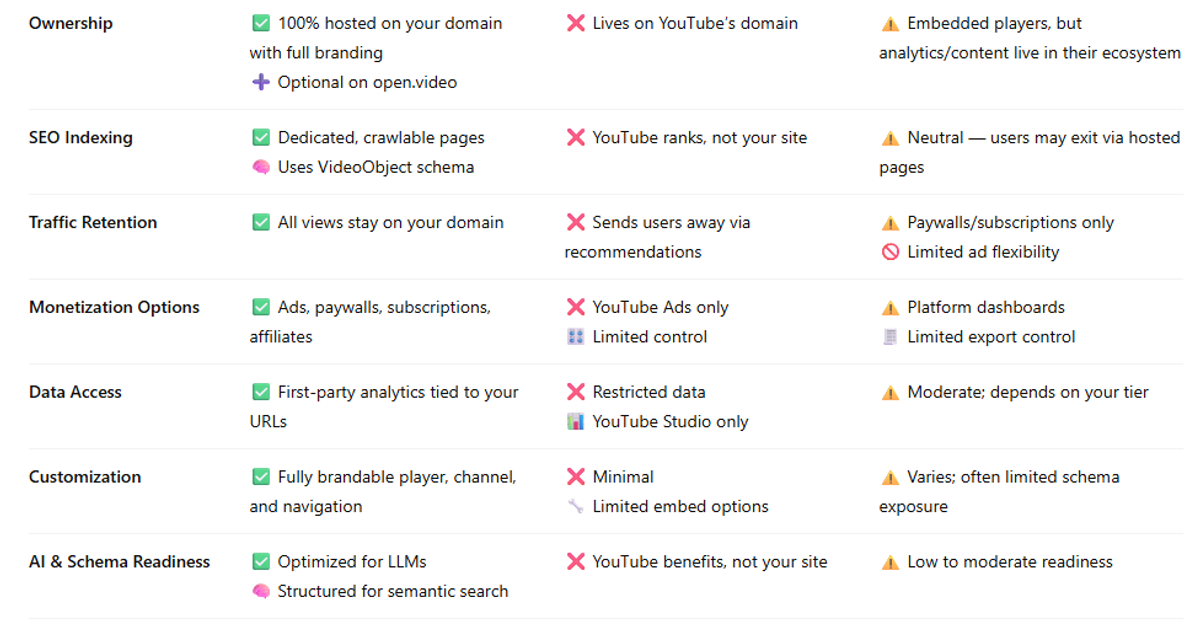What Sets Open.Video Apart from Other YouTube Alternatives
Most YouTube alternatives either trap your audience inside another platform or give you a fancy player with zero SEO value. Open.Video is different. It’s a first-party video engine built for the open web—where every video lives on your domain, ranks in search, and earns on your terms. Keep your traffic, own your data, and build long-term value for your brand.

What Sets Open.Video Apart from Other YouTube Alternatives
If you’re exploring YouTube alternatives for hosting and monetization, you’ve probably noticed they tend to fall into two camps:
“Walled-garden” platforms that own the audience and push their own recommendations, or
“Video players with paywalls” that look nice but do little for search, growth, or data freedom.
Open.Video was built to break out of both boxes. It’s a video engine for the open web—one that lives on your domain, matches your brand, and turns every video into a true SEO asset with flexible monetization. Below is a practical look at how it’s different and why that matters.
TL;DR — The Big Differences
Comparison: Open.Video vs. Other Hosting Platforms

1) First-Party, Not Third-Party
Most “alternatives to YouTube” still treat your content like it lives on their platform—even when you embed it. Open.Video flips that model:
Result: You build equity on your own domain for maximum ownership—or start on open.video for simplicity, knowing you can migrate anytime.
2) SEO That Actually Works (Because Pages Are Built for It)
Lots of hosts promise “SEO friendly.” Open.Video delivers it by making the page the product—not just the player.
Result: Your videos can rank in Google and AI results the same way strong articles do—because they’re first-class pages, not just embeds.
3) Monetization on Your Terms
YouTube forces you into its ad ecosystem and payout rules. Some enterprise players default to subscriptions or paywalls. Open.Video is payment-model agnostic:
Result: You choose how each video earns—and can adjust anytime.
4) Keep the Traffic You Worked For
External platforms recommend other people’s videos right next to yours. Even many “pro” hosts link out to their own galleries.
Result: Higher pages-per-session, better retention, and more revenue opportunities.
5) Data, Privacy, and Portability
Data should inform your strategy—not be hidden behind a vendor dashboard or watered down by third-party cookies.
Result: Cleaner data, easier attribution, better decisions.
6) Built for the AI + Search Future
“Answer engines” reward structured, unambiguous content. Open.Video pages are crafted for that:
Result: Your library is easy for LLMs and search crawlers to understand, cite, and surface.
7) Distribution Without Dilution
You can still benefit from YouTube or social reach—just not at the expense of your own property.
Result: Platform discovery fuels first-party growth.
8) Practical Operations: It Scales Like a Platform
Open.Video is not just a “player.” It’s a full content system.
Result: The bigger your library, the more value you unlock—without extra workload.
The Bottom Line
If you want more than a pretty player—and more than rented reach—Open.Video is a true first-party video engine. It turns videos into SEO-indexable pages, keeps traffic on your site, gives you flexible monetization, and hands your data back to you.
You can even start fast by hosting directly on open.video, then later migrate to your own domain for full ownership and long-term SEO benefits.
Ready to make your videos work for your domain, not someone else’s? Build your library on Open.Video and own the upside.
About Jeff Bernard
Jeff Bernard brings a wealth of experience in curating innovative digital strategies that drive user acquisition, engagement, and ultimately, digital revenue growth. He currently serves as VP of Content Partnerships at Open.Video, where he helps creators break free from walled gardens and take ownership of their content on the open web. Jeff also leads as the VP of Global Publisher Success at Ezoic, a recognized leader in the digital advertising space. He holds an M.B.A. from the University of Redlands and a B.A. in Communication from California State University San Marcos. Outside of work, Jeff enjoys life with his wife and two boys - often found coaching youth soccer or battling it out on the tennis court.
